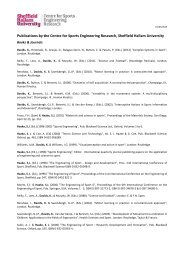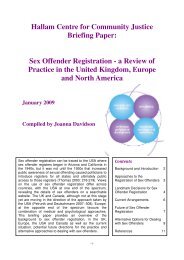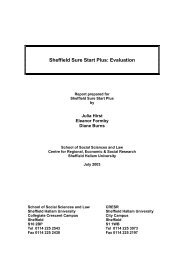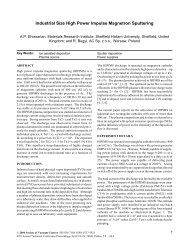The exercise of judicial discretion in rent arrears cases - Sheffield ...
The exercise of judicial discretion in rent arrears cases - Sheffield ...
The exercise of judicial discretion in rent arrears cases - Sheffield ...
Create successful ePaper yourself
Turn your PDF publications into a flip-book with our unique Google optimized e-Paper software.
them where they did not appear. <strong>The</strong>y were <strong>in</strong> a position to meet with the tenant at court<br />
and make agreements <strong>in</strong> the doorway:<br />
“<strong>The</strong>re’s more opportunity for the hous<strong>in</strong>g <strong>of</strong>ficer to talk to the tenant at court and,<br />
you know, get to the bottom <strong>of</strong> what’s go<strong>in</strong>g on, and try and expla<strong>in</strong> th<strong>in</strong>gs” (DJ L)<br />
Good hous<strong>in</strong>g <strong>of</strong>ficers cared about their tenants and might “veer on the side <strong>of</strong> be<strong>in</strong>g as fair<br />
to the tenants as possible” (DJ R).<br />
Local authority claimant representatives were generally regarded positively. <strong>The</strong>re was said<br />
to be more variation as regards hous<strong>in</strong>g associations:<br />
“A bit like that page <strong>in</strong> your diary which, for French w<strong>in</strong>e, 0 was a bad year and 10<br />
was excellent” (DJ P)<br />
Poor representatives had ‘scripts’, or had to go through the file dur<strong>in</strong>g the actual hear<strong>in</strong>g,<br />
and were unable to answer questions about their tenants. Some judges had strident<br />
approaches when deal<strong>in</strong>g with such representatives, for example refus<strong>in</strong>g them rights <strong>of</strong><br />
audience or adjourn<strong>in</strong>g their claims. Poor representatives could also affect decision-mak<strong>in</strong>g:<br />
“Sometimes they really drive you beyond the pale…it’ll actually work <strong>in</strong> the tenant’s<br />
favour…I ought to be be<strong>in</strong>g fair to both [sides, but] you’re only human.” (DJ O)<br />
This difference between local authority and hous<strong>in</strong>g association representatives suggests<br />
that the outcome <strong>of</strong> <strong>cases</strong> might be affected by the type <strong>of</strong> claimant. We exam<strong>in</strong>ed our<br />
quantitative data to explore the evidence for such a relationship, which might expla<strong>in</strong> some<br />
<strong>of</strong> the differences between the four sample courts discussed <strong>in</strong> the previous chapter. For<br />
example, <strong>in</strong> London court, the recorded <strong>cases</strong> were evenly split between local authority and<br />
hous<strong>in</strong>g association claimants. In West Country court, 100% <strong>of</strong> the <strong>cases</strong> were brought by<br />
hous<strong>in</strong>g associations, probably ma<strong>in</strong>ly by the landlord to whom the former local authority<br />
stock had been transferred, which therefore operated very much as a local authority. <strong>The</strong><br />
<strong>cases</strong> recorded at Northern 1 court were all brought by the local authority, while at Northern<br />
2 court the local authority was responsible for 88% <strong>of</strong> the claims.<br />
Although the actual numbers are small, and the results should therefore be read with some<br />
caution, the follow<strong>in</strong>g differences were noted:<br />
Where local authorities requested an outright possession order at the first hear<strong>in</strong>g<br />
(n=42), that order was made <strong>in</strong> 91% <strong>of</strong> <strong>cases</strong>; the equivalent for hous<strong>in</strong>g associations<br />
(n=36) was 56%.<br />
Where local authorities requested a suspended possession order at the first hear<strong>in</strong>g<br />
(n=105), that order was made <strong>in</strong> 72% <strong>of</strong> <strong>cases</strong>; the equivalent for hous<strong>in</strong>g<br />
associations (n=56) was 57%.<br />
47
















